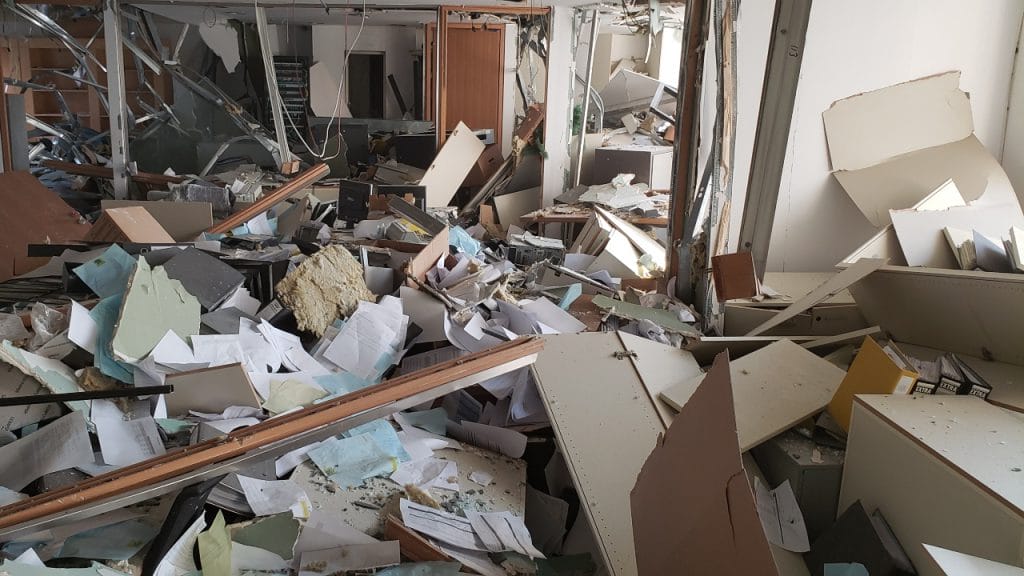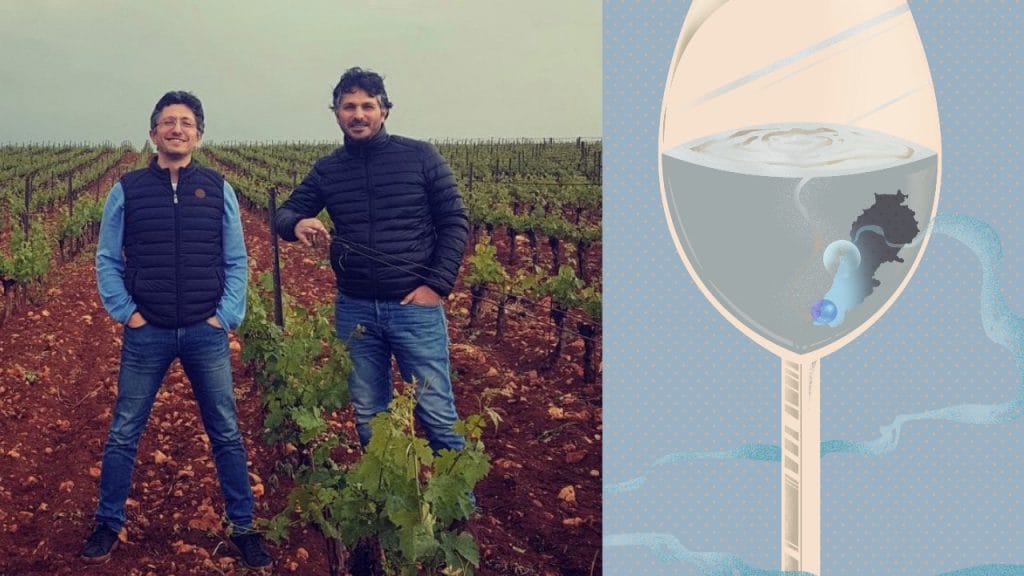Tale as old as time: Beirut, the romanticised, orientalised Paris of the Middle East, burns from a bonfire of human folly; sectarianism, civil war, ages-old enmity. As its port erupted in a mushroom cloud last August, tremors were felt in neighbouring countries. Six hundred metres away, the Saadé brothers picked themselves up and their critically wounded father in what remained of their office. They had been planning the year’s harvest, a pivotal moment, less than two weeks away. The story of Chateau Marsyas and Domaine de Bargylus is a story of Lebanon and Syria.

They managed the harvest from the side of their father’s hospital bed. Grape samples were brought by taxi and tasted to determine the date for harvesting. “Many taxis, many batches of grape samples, on a repetitive basis, for each plot, each variety,” Karim Saadé tells Robb Report Malaysia from Beirut.
He, his father Johnny and brother Sandro have recovered from their physical injuries but the effects of the explosion remain in their very being.
“We all need psychologists but we need time to do that,” he says about keeping the business and the winemaking going.”
“You just keep yourself busy with other things that matter and forget about dealing with that.”

For better or worse, the current moment is a palimpsest of memory; like the sedimentary layers of ancient terroir that grape growers and winemakers strive to express with the highest fidelity.
Those devoted to their vocation accelerate the slings and arrows of their own outrageous fortunes as their karma unwinds to provide a glimpse of such origins. This much is spoken of in spiritual traditions of old.
Ultimately, the process of self-annihilation reveals the source of everything and nothing. As an approach to wine appreciation and the discovery of provenance, it takes some beating.
In brief, the vineyards of Domaine de Bargylus date back to the Canaanites, ancient Greeks and Romans. Those of Marsyas are in Lebanon’s Bekaa Valley, where Baalbeck or Heliopolis, the Greek City of the Sun once stood. It is also where the ruins of the Temple of Bacchus are now found. Marsyas is named for the Satyr of mythology, and Bargylus, the mountain in the valley where the Romans once seriously cultivated grapes.
In 1997, the Saadé family was about to buy an estate in Bordeaux they knew quite well. When the time came, Johnny R Saadé consulted his sons, Karim and Sandro.
“That’s the type of man that he is, even though we were quite young at the time,” says Karim. The family decided it would be “much, much more challenging and interesting to create something in our own lands.”
With the collaboration of winemaker Stéphane Derenoncourt, a great advocate of terroir and minimal intervention in the vineyard, Bargylus’ first vintage appeared in 2006, and Marsyas’, in 2007, both reds.

Bargylus remains Syria’s first real wine venture. Since the outbreak of war there in 2011, the brothers have been forced to run it remotely from Beirut. Karim’s explanation for why they persist with it makes for insightful B-School material: “We have made the choice to be in this area of the world where we come from, knowing very well that it is unstable and could be unstable. We were prepared to deal with challenges – this is what we do.”
The Saadé family trace their Orthodox Christian origins to the ancient coastal city of Laodicea (now Latakia) in Syria, as well as Antioch, Alexandria, Tripoli (in Lebanon) and Mount Lebanon.
“Now, it’s becoming extremely, extremely challenging because the situation in the whole area (both Lebanon and Syria) is something nobody could have anticipated.”
“Nevertheless we are somehow mentally equipped for that. I was born in 1974 and lived throughout the civil war in Lebanon so I know what it is. We’ve got it all: civil war in Lebanon, explosion in Beirut, war in Syria… “
“It’s good that I still have some mental balance,” he smiles wryly in his voice
The gumption to respond to unexpected developments keeps the enterprise going. At its heart is the realisation of being something larger than itself. As Karim puts it, “This area of the world – call it the Near East, call it the Levant – Syria and Lebanon can deliver excellence under the right conditions.”
“You need perseverance to create something that will be recognised for its qualities, its excellence. We’re not the first or the only ones, but this is our motivation as a family; to be able to say that we do things without any compromise whatsoever.”
“But around us, things are not so well, the country is in economic crisis, stability is being compromised, people around us are starving, the (Lebanese) pound has lost ten times its value, a world record.”
“Despite that, the Saadé family is moving forward, managing its vineyards. We just look ahead; we don’t look back. “
“Except for the old vintages, of course.”

The wines below were tasted on four separate occasions and shared a quality this writer only knows to describe as “being alive to the world”. Like great company, they meet you as you are, almost breathing (in the glass) in sympathy. The following vintages are available here through Sunrise Wines.
Chateau Marsyas 2013 Blanc
Rich bouquet of citrus and tropical aromas. Complex, nutty, buttery (ghee?) on the palate. Fleshy yet firm, refined, harmonious, giving, nourishing, beautiful even. Progresses naturally to a well-balanced hint of bitter almonds on the finish. Poised like the late summer sun as the seasons pivot. All is well with the world.
Ch Marsyas 2013 Rouge
Rich, complex, savoury, nose of sweet spice; fresh, dusky, lively. Delightful and very attractive. Well-structured, medium bodied, so very palatable, Long, progressive finish; fragrant, alive. Harmonious, balanced, and not a little charismatic. Perhaps conveniently described as a pitch-perfect meeting of oriental and occidental tones but that does not come close to the experience.
Bargylus 2012 Blanc
Fresh stone fruit, peaches and rocks in well-defined notes. Notable light-yellow gold cast; not so much a hue but an attractive translucency. Rounder in the mouth than nose suggests; some fresh cream, and a long firm finish with a hint of lemon rind and minerals at the back of the tongue. For convenience: if Marsyas is a kind of gorgeous Meursault, Bargylus is a left-field Chablis. As if to confound you, a touch of fume mature Riesling on the nose as it develops in the glass. Slightly bracing yet so agreeable and salubrious for one’s cognitive faculties despite or because of its unfortified 15.6 percent(!) alcohol content.
Bargylus 2013 Rouge
Alas, a dry cork but wait. Fitful and alcoholic upon first greeting the world. Striking depth of colour; iron-rich blood or garnet? Firm and lean bodied; masculine but not austere. Clear palate hinting at complexity, opulence even, underpinned by a long broody finish. With time to breathe, a very serious and complex wine, alive with energy. Long finish seems to gain power over time, impressive as it is at first. Vital, complex and sophisticated. Yet to reveal its all.
Post-tasting notes on Bargylus terroir by the winemakers
“The vineyard is effectively located on a geological fault. On one side, the soils are limestone of an exceptional kind; on the other side, the limestone is mixed with flint that amplifies the mineral qualities in the wines. The clays are the link between these two soil profiles. Darker and more intense than the Bekaa clays, they are the element that forges the character and complexity of the reds.”
Photos: Agenor Wine Merchants




